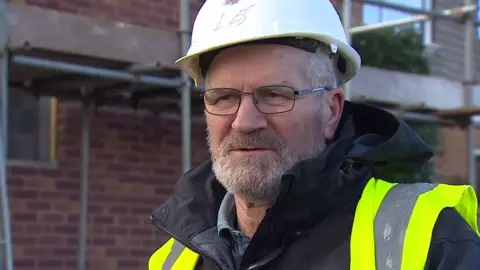Trial helps people recover after knee surgery pain
 BBC
BBCA carpenter whose knee pain continued after replacement surgery says his life has changed due to a clinical trial.
Leslie Scott, from Exeter, Devon, had a knee replacement in 2017, but was still in so much pain that he had to give up work as a carpenter.
He said the Support and Treatment After joint Replacement (Star) trial, which offers patients a plan to reduce pain severity, made a "massive difference".
University of Bristol research said the scheme could save the NHS £14m a year.
The five-year research programme, led by the university and North Bristol NHS Trust (NBT), and published in the Lancet Rheumatology journal, involved patients attending a clinic three months after surgery.
They filled in pain questionnaires, had X-rays taken and were tested for infections.
If needed, patients had ongoing treatment and were phoned up to six times over 12 months to check progress.
'Disrupting my life'
About 360 participants were in the programme, with 240 getting the extra help.
The university said it found those with extra help had less pain severity and impact on daily life; hospital re-admissions were cut and patients had less unpaid time off work.
Mr Scott, 66, said it enabled him to go back to work after pain had been "really disrupting my life".
"If I hadn't have been on the trial, I would have sat on the settee feeling sorry for myself. It's definitely made a massive difference," he said.
About 100,000 people a year in the UK have knee replacements but one in five experience ongoing pain, the university said.
It said the pathway saw more than £700 saved per patient on the programme over the course of a year, which could total an NHS saving of £14m each year in reduced hospital admissions.
Wendy Bertram, from the university, said: "People who did have the treatment were better at both six months and 12 months afterward.
"We're really over the moon."

Follow BBC News South West on Twitter, Facebook and Instagram. Send your story ideas to [email protected].
